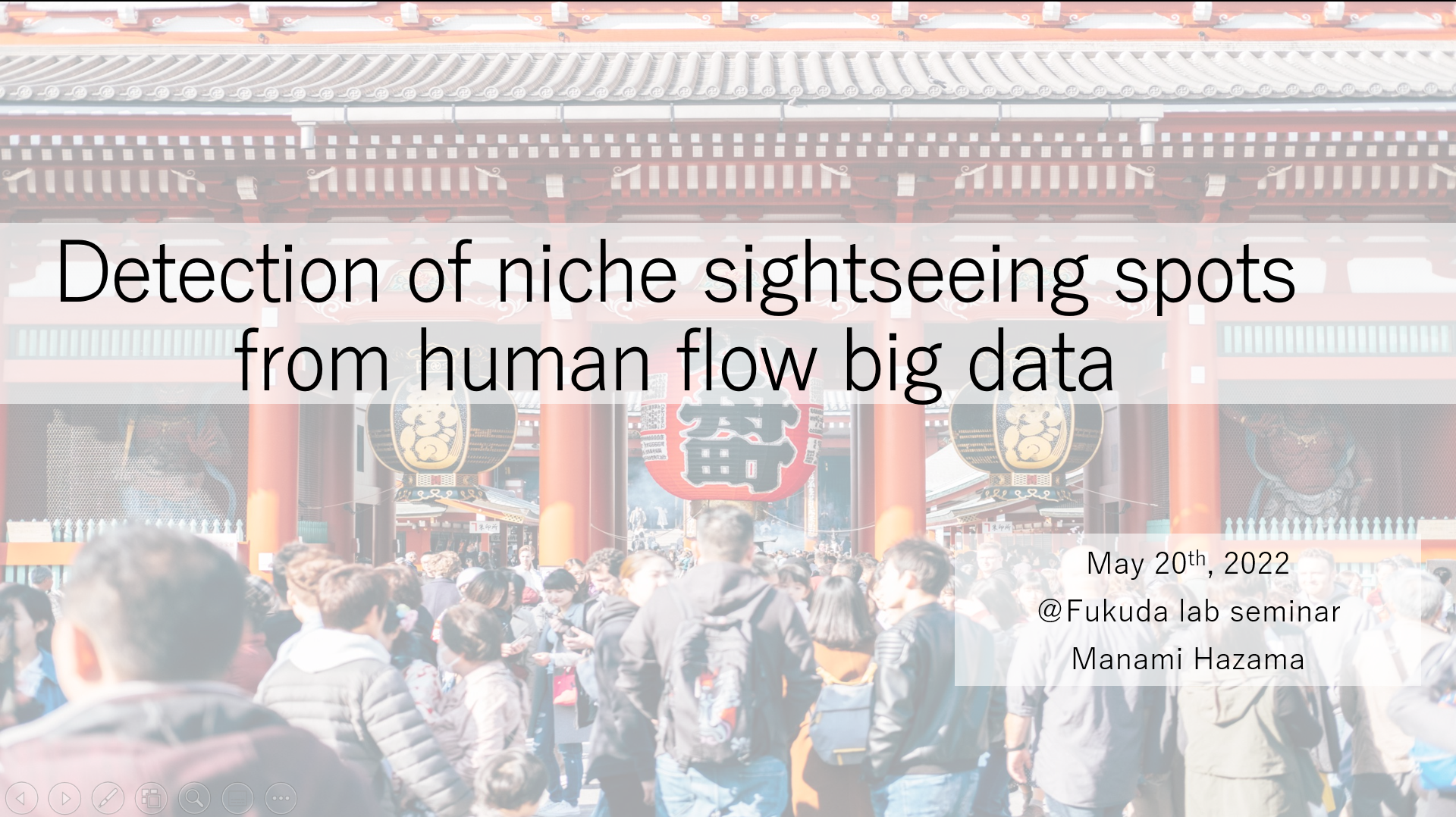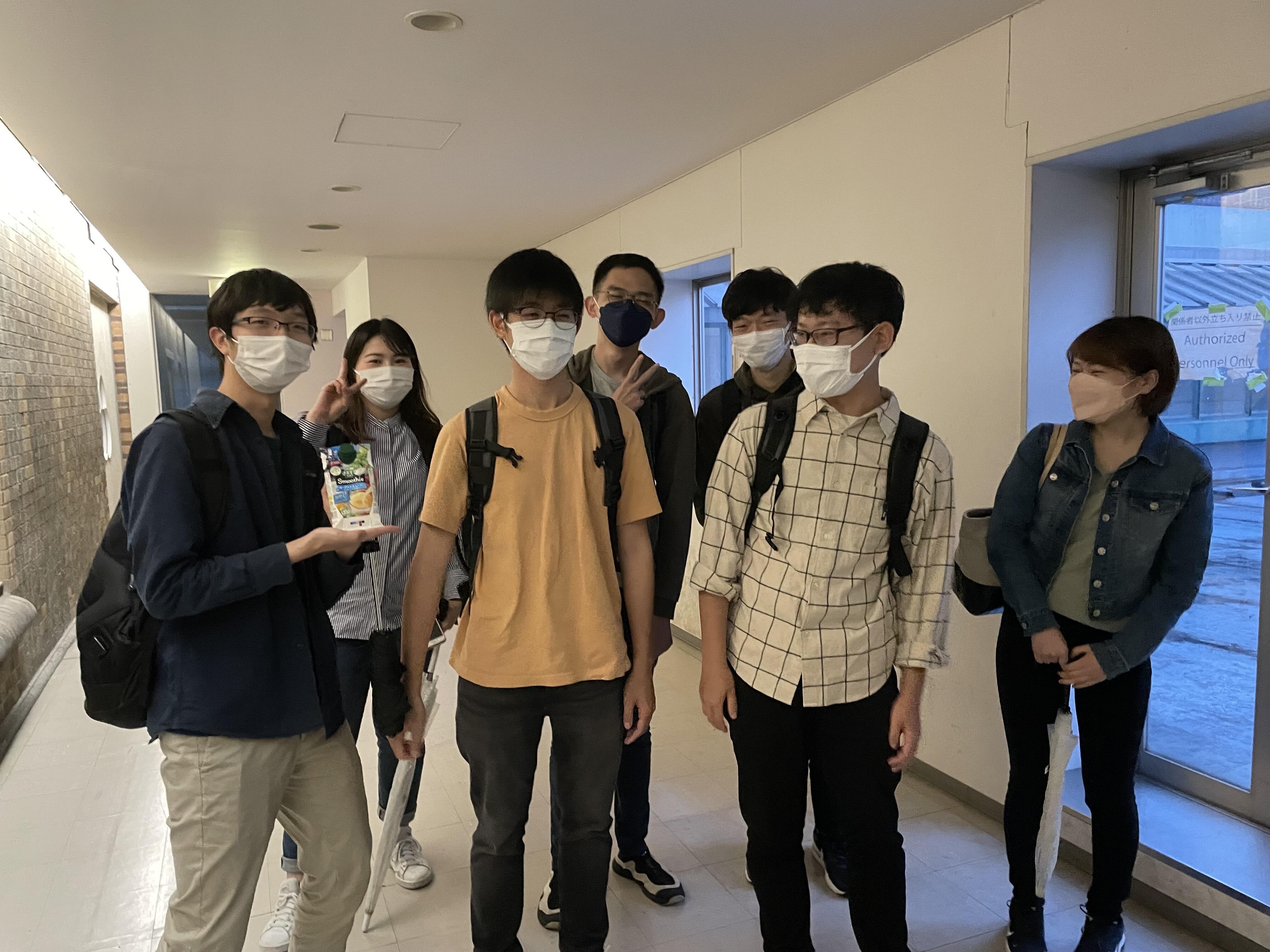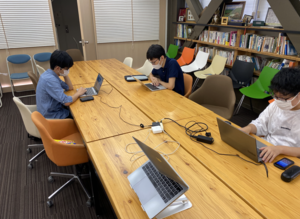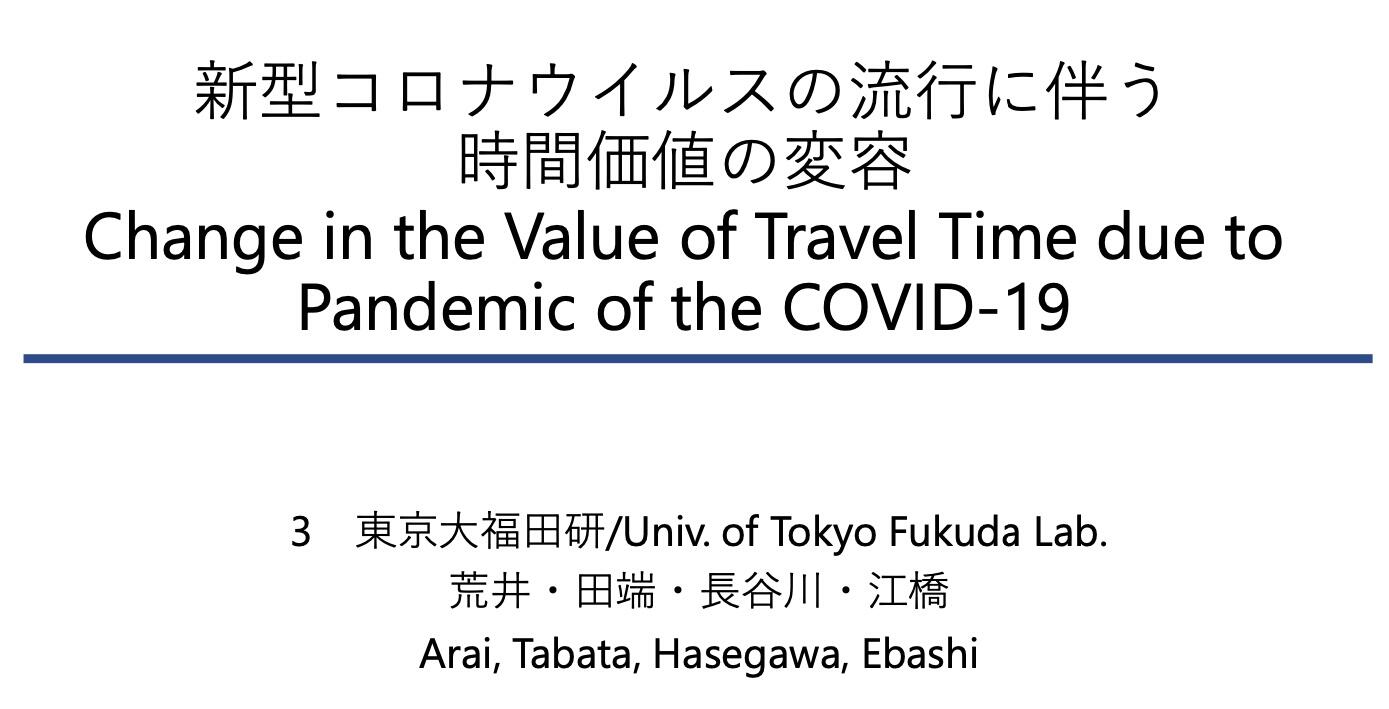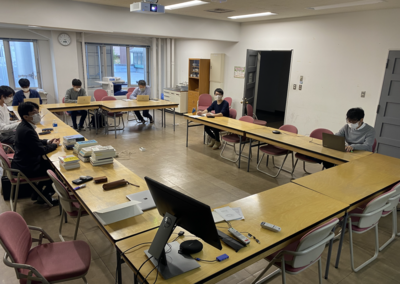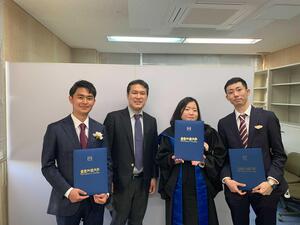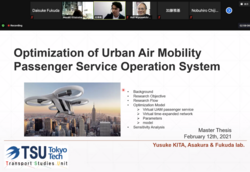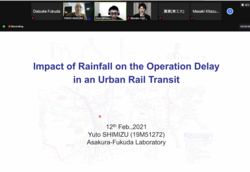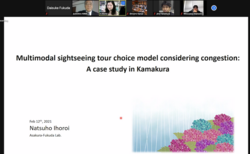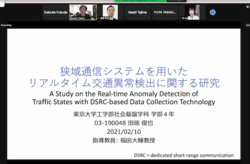2nd-5th Laboratory seminar
Four lab seminars were held this May. Since last month, we have continued to study about discrete choice models in the learning seminar. Each member will explain different models and their estimation methods each week. From logit models to probit models and mixed logit models, I had only dealt with the basic Nested logit model before and I feel struggled now. I will not say that I understood them completely, but at least I could understand some important points of each method, and I will do some revisions when I am going to use them in my future research or practice. As I have listened to these models before, it will be easier to understand them later.
In the research progress seminar, Mrs. Hazama (M2), Mr. Arai (M2), and Mr. Lee (M1) gave presentations. Mrs. Hazama is conducting research on niche tourist attractions using big data, and she is going to conduct a case study on Okinawa. I would love to help her when she conducts a field survey later(for research purposes only!).
Lab activities in 2022 begin!
Hello, I am Hasegawa, a first-year master’s student. For the past few weeks, this page has not been updated by students due to the Corona disaster, but this year, as the webmaster, I would like to provide you with as much information about our laboratory life as possible.
Last month, the first seminar of this year was held. We welcomed two new members, Mr. Lee (M1) and Ms. Nakamura (B4), bringing the total number of student members to nine. Chee Yung (M1), an international student from Malaysia, joined our lab in the middle of last year and had been participating in the seminar online for a long time, but finally he was able to come to Japan on this day and we had a face-to-face seminar with the full group. Many of the classes are now being held in a face-to-face format, and the campus has come back to life, but I hope that the laboratory activities will gradually become more active as well.
As in the previous year, the frequency of seminars continues to be once a week, with one hour each for a basic seminar and a research progress seminar in the first semester. The basic seminar will cover discrete choice, transportation networks, and urban economics. Urban economics is an area that I personally have been working on for the last year, so I hope that it will be a good opportunity to let other members know what I have been doing.
I will continue to regularly post information about our seminars and daily life in the laboratory on this page, so I look forward to your continued support this year.
[Hasegawa]
Presentations of graduation theses and master’s theses in 2021
The master’s thesis presentation of the Tokyo Institute of Technology and the graduation thesis presentation at the University of Tokyo Thesis for the academic year 2021 were held on February 9-10 and February 8-9, respectively. Four M2 students (Ukai, Kimura, Sakurai, and Tabuchi) and two B4 students (Ebashi and Hasegawa) passed the thesis presentations.
In addition, B4 student Hasegawa received the Tanabe Sakuro Prize.
Each presentation title is as follows:
Mr. Ukai: Study of traffic management based on information design
Mr. Kimura: Simulating Time-Varying Fare Policy of Urban Rail Transit Considering Structural Changes in Passenger Demand
Mr. Sakurai: Analysis of Congestion Pricing in A Sightseeing Area with Activity-Based Travel Choice Modeling
Ms. Tabuchi: Evaluation of Subscription Plan in Urban MaaS Considering People’s Daily Activity Pattern
Mr. Ebashi: Online experimental study on traffic information provision method based on self-fulfilling signals
Mr. Hasegawa: Post-evaluation of place-based policy in Japan based on Quantitative Spatial Economics
Members of the Behavioral Model Summer School 2021 Received the Davis Awards
This result was evaluated as an interesting fact finding by behavioral analysis, and hence received the “Davis Award”.
I would we can continue to discover some interesting facts in the real-world through behavioral models.
Lab Activity Started in 2021!
Mr. Ukai: Theoretical basis of information design
Mr. Kimura Departure time selection, user equilibrium, and system optimization
Mr. Sakurai: Mathematical optimization of mobility and activity modeling
Ms. Tabuchi Pricing of MaaS
Mr. Arai: Benefit Evaluation under Uncertainty
Mr. Tabata: Risk-averse route guidance
Mr.Ebashi: Experimental approach in transportation
Mr. Hasegawa: Research Trends in Long-Term Residence Choice
There are three types of seminars in the first semester:
- Basic seminar
It is a seminar in which students learn the basic knowledge required for conducting research, following the textbook. In this semester, we will cover microeconomics and game theory, fundamentals of econometric analysis, mechanism design, and data-driven statistical analysis (machine learning, Bayesian, optimization). - Research progress seminar
It is a seminar in which each member reports on his/her research progress. Each member is expected to report twice every six months. - Paper reading seminar
It is a seminar for reviewing and presenting English literature. Each member chooses an English paper that can introduce his/her research theme as “comprehensively” as possible.
Although there are many uncertainties due to the COVID-19 pandemic, all members are enthusiastic about their research.
I look forward to working with you all this year.
The 19th Behavioral Modelling Summer School
The annual Behavioral Modelling Summer School was held online from 12nd to 15th September. M1 and B4 students Mr. Ukai, Mr. Kimura, Mr. Sakurai, Ms. Tabuchi and Mr. Tabata had participated in this sommuer school.
The title of the summer school was “A Study of Transportation Model based on Personal Attributes in the Post-Pandemic Era”.
The study was based on the assumption that behavior patterns diversify after pandemic, even with the same economic attributes. We then proposed a model to extract new personal attributes from behavioral patterns.
We would like to thank the Hato Laboratory of the University of Tokyo for hosting us and our professors for their guidance.
Thank you very much!
ABM(Activity Based Model) Reading Session
During the summer vacation, we held a reading session of papers on ABM (Activity Based Model).
Volunteers, Ms. Ihoroi, Mr. Sakurai, Ms. Tabuchi, and Mr. Tabata presented papers on ADB, and we deepened our understanding by asking each other questions.
Thank you very much to Ms. Ihoroi for organizing this event and to Prof. Fukuda for his guidance!
Papers covered in the reading session:
Ms. Ihoroi, Mr. Kita, and Mr. Shimizu completed master’s course at Tokyo Tech
Ms. Ihoroi, Mr.Kita, and Mr. Shimizu completed the master’s course and graduated.
I wish you all the best in your future endeavours.
Congratulations!
Yuto Shimizu(M2) won the Student Research Encouragement Award – 2020 Grand Prize- by NTT DATA Mathematical Systems Inc.
Mr. Yuto Shimizu, a second-year master’s student, was selected as the winner of the Student Research Encouragement Award of NTT Data Mathematical Systems Inc. for his master’s thesis entitled “Analysis of the Influence of Rainfall on the Increase of Train Delays in Urban Railways”.
The Student Research Encouragement Award is given by NTT DATA MATHEMATICAL SYSTEMS INC. to students for their outstanding research achievements in the mathematical sciences.
The award was featured on the Tokyo Institute of Technology’s Environmental and Civil Engineering web site and in the Nihon Keizai Shimbun newspaper.
Congratulations!
Reference articles:
NTTデータ数理システムのデータサイエンスツールで学生が社会課題に挑む
朝倉・福田研究室の清水裕斗さん(修士2年)の研究が、(株)NTTデータ数理システム「2020年度学生研究奨励賞 最優秀賞」を受賞
| Lab Life by Students Research News by Professor
2020 Graduation Thesis/Master’s Thesis Presentation
The 2020 graduation and master’s thesis presentations have ended successfully. The titles of each presentation are as follows.
- Ms. Ihoroi: Multimodal sightseeing tour choice model considering congestion: A case study in Kamakura
- Mr. Kita: Optimazation of urban air mobility passenger service operation system
- Mr. Shimizu: Impact of Rainfall on the operarion delays in an urban rail transit
- Mr. Tabata: A study on real-time anomaly detection of traffic states with DSRC-based data collection technology
Thank you all for your hard work.
